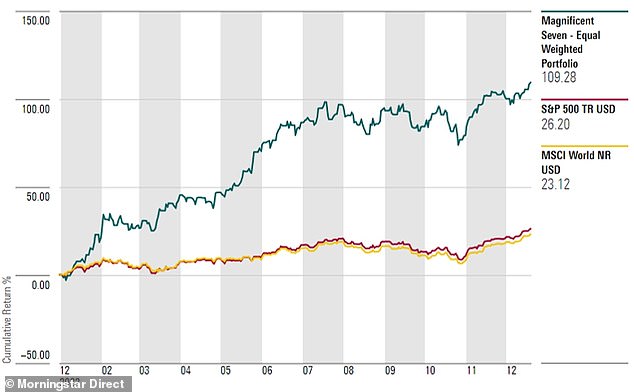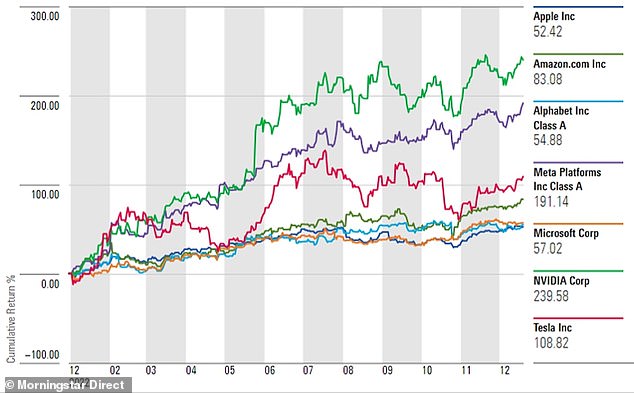What next for tech stocks after AI helped 'Magnificent Seven' dominate 2023?
If you were describing the tech sector in 2023, a classic 1960s film set in 19th century Mexico would probably be an accurate analogy.
“The Magnificent Seven,” is how Michael Hartnett, chief investment strategist at Bank of America, described the crème de la crème of American technology companies.
Collectively, Apple, Amazon, Alphabet, Meta, Microsoft, Nvidia and Tesla will not only outpace the broader tech industry by 2023, but will also drive a substantial portion of global stock gains.
Since January, 'M7' stocks have achieved a cumulative return of 109 percent, while the comparables for the S&P 500 and MSCI World Indexes are 26 percent and 23 percent respectively.
But smaller and mid-cap technology companies have had a tougher year, suffering the impact of higher interest rates and increased economic and geopolitical uncertainty.
Background: The broader technology sector has not had a disastrous year, despite massive job losses and subdued confidence
Could the next twelve months mark a reversal of fortunes? Will the rest of the tech sector be able to catch up with companies like Apple and Tesla, or will tougher times continue?
The rise of AI is driving outsized profits for Magnificent Seven
The big seven fell almost 40 percent in 2022 after the end of lockdown restrictions led to people spending less time online.
Interest rate hikes also increased the cost of raising capital and weakened growth prospects, leading these companies to implement significant cost-cutting measures, including large-scale layoffs.
Cost cuts fueled stronger profits as the U.S. economy continued to defy widespread gloomy forecasts, said Ben Rogoff and Alastair Unwin of the London-listed company. Polar Capital Technology Trust.
But Rogoff and Unwin suggest that the M7's peak performance in 2023 will mainly be driven by the hype around artificial intelligence, with each company enjoying significant exposure.

Runaway returns: 'M7' stocks have delivered a cumulative return of 109 percent this year, compared to 26 percent for the S&P 500 and 23 percent for the MSCI World Index
Nvidia's shares are up an astonishing 241 percent this year on rising demand for its graphics processing units, which are microchips often used to handle advanced AI tasks.
Whether it's Microsoft's investment in ChatGPT maker OpenAI or Amazon's purchase of a stake in startup Anthropic, the M7 group is playing an outsized role in AI, putting them in an ideal spot to capitalize on the long-term growth of the technology.
How are other tech companies performing?
The broader technology sector has not had a disastrous year, despite massive job losses and subdued confidence.
Of the 132 technology stocks on the Russell 1000 Index – the 1,000 top-ranked U.S. companies by market capitalization – 100 have returned better than the index's average stock return of 8.5 percent through 2023.
Meanwhile, European technology stocks have recovered from their autumn slump and are up an average of 32 percent as of December 15, according to Morningstar's Developed Markets Europe Technology Index.

Bumper year: The 'Magnificent Seven' tech stocks include Apple, Amazon, Microsoft, Facebook owner Meta and Google's parent company Alphabet
Nevertheless, interest rate rises have exacerbated problems for small and medium-sized technology companies, as their greater reliance on bank loans means debt payments tend to cover a larger share of profits.
Technology companies of all sizes had found it relatively easy to raise funds in the decade leading up to the most recent rate hike cycle, with investors willing to back consistently unprofitable companies on the promise of explosive growth.
A higher interest rate environment has increased the appeal of mega-cap tech companies relative to smaller peers, thanks to eye-popping cash piles and robust balance sheets that boost their immunity from rate hikes.
“People are worried about a recession, so they've gravitated toward companies they think they can survive,” said Callie Cox, U.S. investment analyst at eToro.
Will 2024 be better for small and mid-cap tech stocks?
Falling inflation and growing signs of a “soft landing” for the US economy have caused investors to step up their bets on central banks to cut interest rates next year.
Any rate cut would be welcomed by tech companies outside the Magnificent Seven, potentially easing their debt burdens and encouraging them to accelerate investment in research and development.

Future of Technology: Artificial Intelligence is not only at the forefront of the technology industry; it will only grow by leaps and bounds among tech companies of all sizes
Richard Hunter, head of markets at Interactive Investor, says: 'Those technology stocks further down the food chain generally don't have the luxury of being able to fund their expansion with existing cash reserves.
“So if financing costs are lower, they should benefit from being able to expand more cheaply than they are now.”
Schroders' analysis dates back to the late 1980s finds that during the “recession and recovery phases” of an economic cycle, small caps have double the annualized returns of large caps.
What trends will drive the technology sector next year?
Artificial intelligence is not a 2023 phenomenon and will likely dominate technology growth plans in the coming years, potentially transforming the global economy along with it.
It is predicted that AI will do this will contribute $15.7 trillion to global GDP by 2030, according to a PwC report with the United States and China receiving the majority of the profits.
“While there may be setbacks or disappointments along the way, we are 'AI maximalists' who believe the technology could become the next general purpose technology (GPT),” said Polar Capital's Rogoff and Unwin.
“We want to encourage investors to think about their exposure to this extraordinary change in terms of their exposure to technology and beyond.”

Triumph: Payment platform Wise, co-founded by Estonians Kristo Käärmann (pictured) and Taavet Hinrikus, is one of the most notable British tech success stories
Beyond AI, companies will continue to take online security seriously as awareness grows about the enormous costs of cyber attacks.
Sustainable technology is also expected to become increasingly prominent amid the ever-present threat of climate change, while Richard Hunter says investors should beware of nanotechnology and genomics-related personalized medicine.
Which stocks could perform well outside the Magnificent Seven?
James Dowey, co-lead manager of the Liontrust Global Technology Fund, offers a tip for Silicon Valley cloud computing company ServiceNow for 2024.
The Salesforce rival, whose shares are already up more than 80 percent this year, recently launched the AI Lighthouse program with Nvidia and consulting firm Accenture to help its customers build AI tools.
Dowey also recommends a payment platform Sensibleone of the most remarkable British tech success stories, with its £8 billion IPO two years ago being the largest ever on the London Stock Exchange.
“This is not the climate to make big, bold calls. Financial strength is still more important than a compelling story.'
In its latest interim results, the group revealed that customer numbers rose by more than 30 percent year-on-year, sales rose by a quarter and pre-tax profits almost quadrupled to £194.3 million.
Wise, co-founded by Estonians Kristo Käärmann and Taavet Hinrikus, expects revenues to increase by up to a third this financial year and rise by at least 20 percent per year in the medium term.
“Like everyone else, Britain is significantly behind the US in terms of technology companies,” says Dowey. “That said, we admire Wise… and their innovations to disrupt banks' exorbitant fees for sending money across borders.”
Callie Cox of eToro suggests that investors “consider holding on to quality risk as they slowly dip their toes back into smaller tech companies.”
“Don't overstate the risk yet,” she warns.
“This is not the climate to make big, bold calls. Financial strength is still more important than a compelling story.'
Some links in this article may be affiliate links. If you click on it, we may earn a small commission. That helps us fund This Is Money and keep it free to use. We do not write articles to promote products. We do not allow a commercial relationship to compromise our editorial independence.
